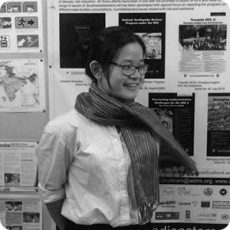Democracy is in crisis around the world while authoritarianism is on the rise in a growing number of countries, especially developing ones. More and more experts warn that authoritarianism is creeping into a greater number of democracies than ever before. How does authoritarianism affect development aid in developing countries and what can the international community do to combat authoritarian regimes? These are the questions answered by several experts in the democratization sector.
How does authoritarianism affect development aid in developing countries?

“Authoritarian governments are able to impose their own conditions for accepting development aid. While the state imposes a restrictive environment for CSOs, government bodies, organizations and GONGO (government-sponsored non-governmental organizations) are able to receive funds specifically intended to support civil society development. The inclusion of different groups of society (CSOs, grass roots, local communities) in the implementation of development projects as in the norm for development projects doesn’t work in developing countries. The perception of the state as regards on the role, place and function of civil society and CSOs do not receive the same recognition as within the EU and the developed world.”

“Development aid has for many years used ‘conditionality’ to promote the view that the economic policies of low inflation, low budget deficits and high trade volumes will support growth. The premise here is that authoritarian systems will work to ensure that economic policies will be aligned to achieve these three factors. Liberal democracy has taken a big hit globally since the financial crisis (2008) and wars in Iraq, Syria and Yemen. Authoritarianism is far less susceptible to ‘conditionality’. It asserts a clear counter norm, which is that development aid is used to interfere in the domestic affairs of countries. There is access to other sources of funding and support in the global context with China, Russia, Saudi Arabia. New and different alliances are being informed. Illiberal values are reasserted. Development aid finds that the canvass it can work on is restricted with outcomes and alliances being less predictable.”

“There is a direct and indirect link between development aid and authoritarianism in developing countries. The direct link is seen when we refer to studies, from which we can draw conclusions that foreign assistance to developing countries with authoritarian rule receives by far much less international aid than more promising transitional democracies. The second factor tells us that the countries that move from such a regime to democracy start to receive more aid. There is a good clear-cut example with Ukraine where the country’s international aid doubled from 2012 to 2015 when the democratic government came into power. An indirect link is assessed rather through the effectiveness of implemented development programs. In countries with an authoritarian regime, the implementation of development aid is usually compromised with the prerequisites of unequal wealth and power distribution and the creation of a forged system of checks and balances.”

“Latin America can be considered as the developing region with the greatest commitment to democracy given that, via the Organization on American States-OAS, all 32 members have agreed to marginalize any government that does not respect the principles of democracy (free elections, functional parliament-congress and an independent judiciary). However, as is clear, this agreement has not stopped the surge of authoritarian regimes such as in the case of Nicaragua and Venezuela. These two cases clearly show that, unlike the Korean and Taiwanese authoritarian models that focused on economic development, authoritarian LA has favored the19th century semi-feudal states that plagued the region in which the control of the state had only one purpose – economic well- being. It now camouflages itself behind the Obsolete Ideological banners of the cold war. Today, this model can also be seen in Africa and parts of Asia.”

“With the rise of authoritarianism in developing countries, development programs continue to strictly limit its intervention in socio-economic development but have less influence in the political sphere, for example, good governance or human rights. This, in turn, legitimizes the regime through development programs progressing achievements rather than holding the government accountable. Vigorous security checks and complicated funding processes affect the operation and effectiveness of development organizations, even leading to the withdrawal of the aid community.”
What can the international community do to combat authoritarian regimes in developing countries?

“So, to combat authoritarian regimes in developing countries, the international community must lead by example and treat all recipients of official development assistance (ODA) or development aid equally and enforce the conditions associated with the aid without discrimination as to whether a recipient country is an ally or not. Based on past experiences and observations, I strongly believe that political reforms, including institutional and constitutional reforms in developing countries will precede development aid and not the other way around. In order to ensure that development aid is used for the intended development project, the international community should have a control mechanism in place which will be responsible for inspecting and evaluating the project after its completion.”

“The international community should emphasize the establishment of norms and institutions that regulate the powers of the state in curtailing the rights of citizens. Some states have signed international treaties and conventions that protect the freedoms and rights of their citizens but have not domesticated the enforcement precepts of these rights and freedoms in their statutes. On the other hand, access to international development aid should be conditional on a demonstrable commitment by the state to grassroots social development projects. I believe the threshold should be to focus development aid on funding grassroots projects and initiatives that offer pragmatic solutions towards addressing endemic poverty, inequality and building social consciousness. This will promote accountability and give impetus to the fight against corruption in developing countries. It is the only way the authoritarian populist political machinery will grind to a halt.”

“For international development agencies in particular, providing assistance in authoritarian regimes poses unique challenges as they are often required not only to respond to the actions of unpredictable regimes (restriction, interference, intimidation) but also to translate the demands and needs of populations who are likely being prevented from expressing their real needs. Another dilemma is how and under what circumstances the international community should denounce regime violence and human rights abuse. Also, how to promote development in a context where civil society and the media are controlled by the regime with little transparency or none at all needs to be addressed. Moreover, the action to combat authoritarian regimes is often curtailed by political elements, for example determining what can be classified as an authoritarian regime is relatively subjective. Some countries could identify a particular regime as authoritarian, while other countries could see this differently.”
Check more than 180 job opportunities linked to democracy here.

